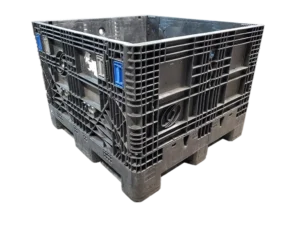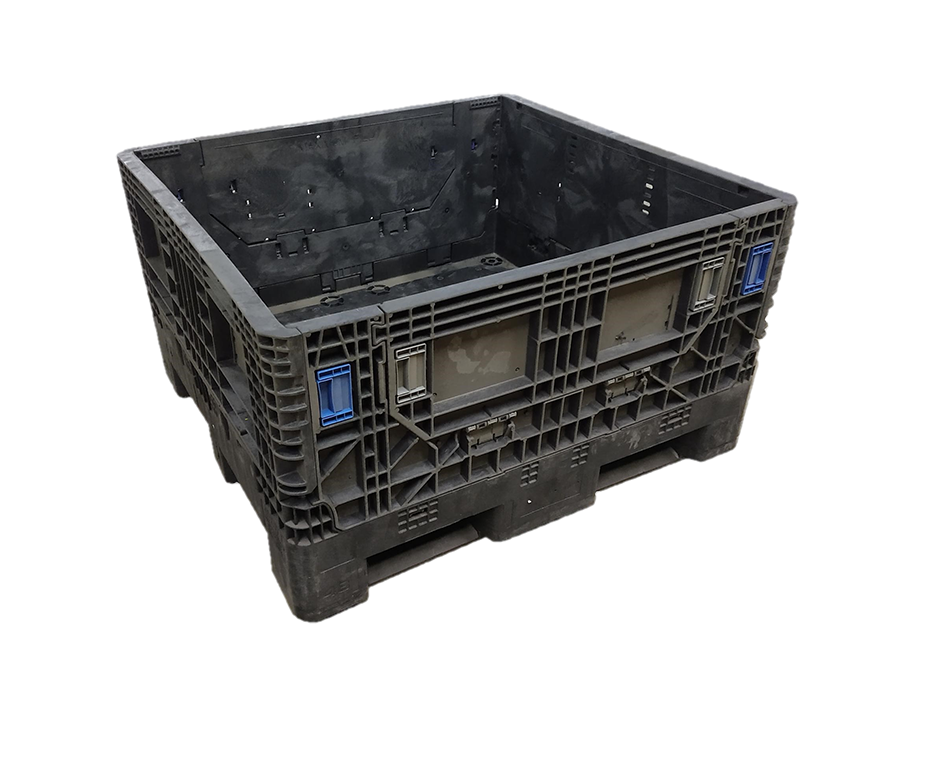The Ultimate Overview to Choosing the Right Bulk Containers for Your Organization Demands
Choosing the proper mass containers is essential for any company that depends on reliable logistics. Different kinds of containers exist, each developed for particular materials and applications. Elements such as size, product compatibility, and regulatory criteria play a substantial duty in this decision-making process. Understanding these components can result in enhanced functional performance. Nonetheless, several businesses overlook vital aspects that might boost their general efficiency and sustainability. What are these factors to consider?
Comprehending Different Kinds Of Bulk Containers
Bulk containers work as essential tools for businesses seeking reliable storage and transport solutions. These containers can be found in various types, each designed to satisfy certain operational requirements. One common type is the intermediate mass container (IBC), which is suitable for granulated and liquid products, providing a balance of capacity and maneuverability. One more prominent alternative is the mass bag, or FIBC, ideal for completely dry, flowable items. These flexible containers are lightweight and can be quickly carried and saved. For larger materials, rigid bulk containers are frequently utilized, providing toughness and security for risk-free handling. Additionally, there are specialized containers tailored for unsafe products, ensuring compliance with safety regulations. Comprehending the unique features of these mass container types enables companies to make enlightened decisions that maximize logistics and minimize expenses. By picking the best container, firms can boost their functional efficiency and streamline their supply chain procedures.
Trick Material Factors To Consider for Bulk Containers
When choosing bulk containers, it is important to ponder the products utilized in their construction. Elements such as chemical, strength, and durability compatibility play a vital duty in ensuring the containers fulfill particular functional demands. Furthermore, weight and transportability concerns can affect both effectiveness and transport logistics.
Product Durability and Toughness
Longevity and toughness are vital elements in picking materials for bulk containers, as they directly affect the container's capability to withstand various ecological conditions and managing processes. Materials such as high-density polyethylene (HDPE), polypropylene, and stainless steel are frequently favored for their robust buildings, using resistance to influence, temperature, and abrasion variations. The choice of product additionally affects the general life expectancy of the container; more powerful products commonly lead to less regular substitutes, bring about set you back savings gradually. Furthermore, the weight of the product can impact shipping prices and ease of handling. Organizations need to consider their specific functional settings and the potential for wear and tear to assure peak toughness and stamina in their bulk container choice.
Chemical Compatibility Elements
Understanding chemical compatibility is essential for picking mass containers, as the products used have to stand up to the certain compounds they will hold. Various factors influence compatibility, including the chemical nature of the components, temperature, and period of storage space. Destructive chemicals may require containers made from stainless steel or specialized plastics that resist destruction. Furthermore, reactive materials can create warmth or gases, demanding aired vent or pressure-rated containers. The option of container material, whether polyethylene, polycarbonate, or metal, should straighten with the chemical properties of the saved compounds to avoid violations or leakages. Eventually, a thorough evaluation of these compatibility variables ensures safe handling and storage, safeguarding both personnel and the setting while preserving product stability.
Weight and Mobility Problems
Selecting mass containers involves not just reviewing chemical compatibility yet also considering weight and transportability. Businesses must assess the convenience of handling and transport to optimize efficiency. Light-weight products like high-density polyethylene (HDPE) or light weight aluminum can help with much easier movement and reduce shipping costs. Conversely, much heavier containers may give boosted durability yet can hinder wheelchair, specifically in atmospheres calling for regular moving. Furthermore, the layout of the container should permit hassle-free training and stacking, ensuring ergonomic safety for workers. Firms need to also take into consideration the infrastructure offered for transportation; for instance, containers suitable with forklifts or pallet jacks can simplify procedures. Ultimately, the appropriate balance in between weight and transportability directly influences functional performance and cost effectiveness.
Sizing Your Mass Containers for Optimal Efficiency
When sizing mass containers, businesses need to carefully evaluate the measurements called for to fit their details items. Furthermore, weight capacity is an essential variable that influences effectiveness and security throughout transport and storage space. Effective sizing not just maximizes space but also enhances operational operations.
Determining Container Capacities
Selecting the best dimensions for mass containers is crucial for making the most of performance in storage and transport. Businesses should assess their details demands, taking right into account aspects such as available room, the nature of the items being kept, and the approaches of transport made use of. Accurate dimensions ensure that containers fit preferably in cars and storage facilities, lessening lost area and decreasing dealing with time. Criterion dimensions can provide convenience, however custom dimensions could be needed for special requirements or to fit certain items. In addition, it is vital to review piling abilities and accessibility, as these variables influence total functional efficiency. Inevitably, the right dimensions bring about enhanced organization and streamlined logistics, benefiting the overall performance of the business.
Weight Capability Considerations
Recognizing weight ability is important for businesses intending to maximize their mass container efficiency. The weight capability of a container directly influences storage space capacities, transportation logistics, and total operational expenses. Selecting containers with the suitable weight limitations assures that companies can safely keep and deliver their items without risking damages or compliance problems. Overwhelming containers can result in structural failures, while underutilizing capability cause wasted resources. It is very important for businesses to evaluate their product weights and think about any kind of regulative needs when selecting containers. In addition, aspects such as the sort of product, intended use, and ecological conditions must also affect weight capability decisions. By assessing these elements, services can improve effectiveness and ensure a streamlined supply chain.
Regulative Compliance and Safety Standards

Regulative conformity and safety standards play a crucial role in the option of bulk containers for organizations. Organizations has to assure that their containers satisfy numerous guidelines established by regional, nationwide, and global authorities. These requirements usually concern product safety, structural honesty, and proper labeling, which assist avoid accidents and ensure the secure transport of products.
In addition, adherence to industry-specific standards, such as those from the Food and Medication Administration (FDA) or the Occupational Security and Health And Wellness Management (OSHA), is vital for firms handling More Help harmful products or food products. Non-compliance can lead to penalties, legal concerns, or damage to a business's reputation.
Companies ought to additionally consider the container's compatibility with the products being saved or moved to stay clear of contamination or chemical responses (used collapsible containers). To sum up, recognizing and implementing regulatory compliance and security criteria is important for the responsible and effective use mass containers
Sustainability Alternatives for Eco-Friendly Mass Containers

Firms are likewise discovering alternatives made from recycled products, which not just preserve resources but likewise sustain the reusing industry. Innovations in layout permit for lighter containers that call for less energy to transport, additionally boosting sustainability. By incorporating these green bulk container alternatives, companies can demonstrate their commitment to environmental stewardship while meeting customer need for sustainable practices. This shift not just helps the world but can likewise enhance brand name track record and customer loyalty.
Cost-Effectiveness and Budgeting for Mass Containers
While many services concentrate on sustainability, cost-effectiveness continues to be a crucial factor when choosing bulk containers. Organizations has to evaluate the initial acquisition price, along with long-term functional expenses, to guarantee economic stability. Aspects such as reusability, longevity, and maintenance play a considerable duty in identifying total expenses.
Purchasing premium containers might produce greater in advance prices however can lead to financial savings with lowered replacement rates and lowered waste. Additionally, organizations ought to think about transport expenses and storage space performance, as these can influence the overall budget plan.

Frequently Asked Concerns
Just how Do I Determine the Right Container for Hazardous Materials?
To identify the appropriate container for dangerous products, one check these guys out should review compatibility with the material, consider the container's material, check for governing compliance, and analyze capability and safety and security features to ensure proper handling and storage.
Can Mass Containers Be Customized for Certain Products?
Yes, bulk containers can be customized for details products. refurbished bulk containers. Various functions, such as layout, size, and material, can be tailored to fulfill special needs, guaranteeing perfect security and efficiency for delivering and keeping different goods
What Is the Ordinary Life Expectancy of Different Mass Container Kind?
The ordinary life-span of mass container kinds varies; plastic containers last 5-10 years, metal containers 10-20 years, and wooden containers normally last 3-7 years, depending upon usage, maintenance, and environmental conditions.
How Should I Clean and Maintain Bulk Containers?
To clean and maintain bulk containers, one need to on a regular basis inspect for damages, get rid of deposit, wash with ideal cleaning agents, rinse completely, and assurance proper drying out before storage space. Following manufacturer standards enhances long life and security during usage.
Exist Rental Choices for Mass Containers Available?
Yes, various firms use rental choices for mass containers, giving flexibility for companies. These services can fit various demands, enabling firms to handle inventory successfully without the commitment of acquiring containers outright.
Durability and stamina are important variables in choosing products for mass containers, as they straight influence the container's capacity to stand up to numerous ecological problems and dealing with processes. Recognizing chemical compatibility is necessary for choosing bulk containers, as the products used have to resist the specific substances you can look here they will hold. Recognizing weight capability is vital for companies aiming to optimize their bulk container performance. Regulative compliance and safety criteria play a vital function in the choice of mass containers for services. While lots of services concentrate on sustainability, cost-effectiveness stays an important variable when selecting mass containers.